名词性从句学案(优)
高中名词性从句教案
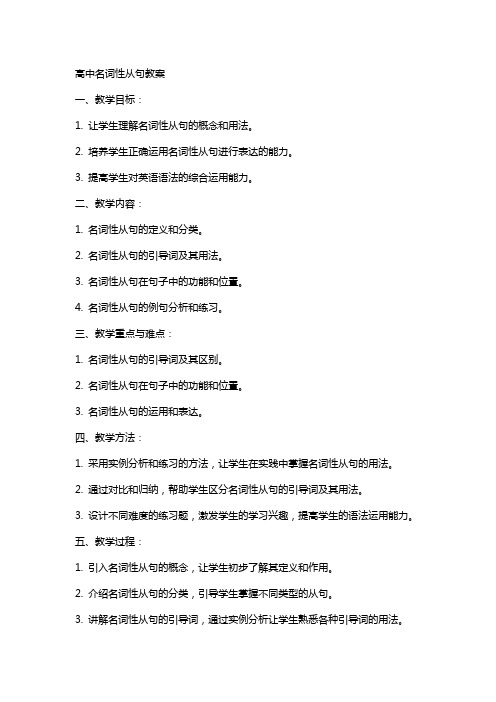
高中名词性从句教案一、教学目标:1. 让学生理解名词性从句的概念和用法。
2. 培养学生正确运用名词性从句进行表达的能力。
3. 提高学生对英语语法的综合运用能力。
二、教学内容:1. 名词性从句的定义和分类。
2. 名词性从句的引导词及其用法。
3. 名词性从句在句子中的功能和位置。
4. 名词性从句的例句分析和练习。
三、教学重点与难点:1. 名词性从句的引导词及其区别。
2. 名词性从句在句子中的功能和位置。
3. 名词性从句的运用和表达。
四、教学方法:1. 采用实例分析和练习的方法,让学生在实践中掌握名词性从句的用法。
2. 通过对比和归纳,帮助学生区分名词性从句的引导词及其用法。
3. 设计不同难度的练习题,激发学生的学习兴趣,提高学生的语法运用能力。
五、教学过程:1. 引入名词性从句的概念,让学生初步了解其定义和作用。
2. 介绍名词性从句的分类,引导学生掌握不同类型的从句。
3. 讲解名词性从句的引导词,通过实例分析让学生熟悉各种引导词的用法。
4. 分析名词性从句在句子中的功能和位置,让学生明白从句的作用。
5. 提供名词性从句的练习题,让学生巩固所学知识,提高运用能力。
6. 总结本节课的重点内容,布置课后作业,让学生进一步巩固所学知识。
六、教学评价:1. 通过课堂表现、练习完成情况和课后作业,评估学生对名词性从句的理解和运用能力。
2. 重点关注学生对名词性从句引导词的识别、从句功能的把握以及句子结构的正确性。
3. 鼓励学生积极参与讨论,提高他们的语法表达自信心。
七、课后作业:1. 完成课后练习题,包括选择题、填空题和改错题,以巩固名词性从句的知识。
2. 选取几个复杂的句子,尝试自己分析其中的名词性从句,并解释其作用。
3. 编写一个包含名词性从句的句子,与同学互相交换并纠正错误。
八、教学拓展:1. 引导学生思考名词性从句在实际语境中的应用,如新闻报道、学术文章等。
2. 讨论名词性从句与其他从句(如定语从句、状语从句)的异同,加深对语法结构的理解。
名词性从句(教案)
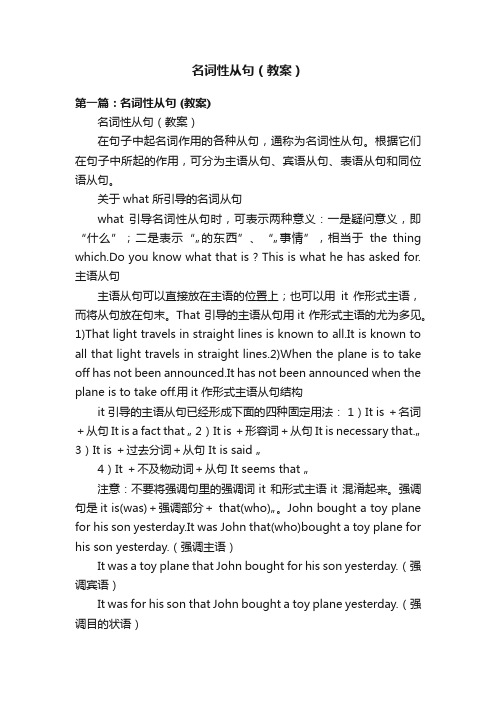
名词性从句(教案)第一篇:名词性从句 (教案)名词性从句(教案)在句子中起名词作用的各种从句,通称为名词性从句。
根据它们在句子中所起的作用,可分为主语从句、宾语从句、表语从句和同位语从句。
关于what 所引导的名词从句what 引导名词性从句时,可表示两种意义:一是疑问意义,即“什么”;二是表示“…的东西”、“…事情”,相当于the thing which.Do you know what that is ? This is what he has asked for.主语从句主语从句可以直接放在主语的位置上;也可以用it 作形式主语,而将从句放在句末。
That 引导的主语从句用it 作形式主语的尤为多见。
1)That light travels in straight lines is known to all.It is known to all that light travels in straight lines.2)When the plane is to take off has not been announced.It has not been announced when the plane is to take off.用it 作形式主语从句结构it 引导的主语从句已经形成下面的四种固定用法: 1)It is +名词+从句It is a fact that … 2)It is +形容词+从句It is necessary that.… 3)It is +过去分词+从句It is said …4)It +不及物动词+从句It seems that …注意:不要将强调句里的强调词it 和形式主语it 混淆起来。
强调句是it is(was)+强调部分+that(who)…。
John bought a toy plane for his son yesterday.It was John that(who)bought a toy plane for his son yesterday.(强调主语)It was a toy plane that John bought for his son yesterday.(强调宾语)It was for his son that John bought a toy plane yesterday.(强调目的状语)It was yesterday that John bought a toy plane for his son.(强调时间状语)宾语从句1.作动词的宾语:Everybody knows that matter takes up space.2.作介词宾语:This depends on how hard you work.3.作形容词宾语:They are confident that they can do it well.4.要注意的问题:1)引导词that的省略:I think(that)you are right.2)形式宾语it:He has made it clear that the meeting will not be postponed.3)否定意义的转移:think, believe, suppose, expect, I don’t think he has time to play chess with you.I d on’t suppose it is the rush hour yet.4)插入语疑问句:I think that John will arrive at five o’clock.When do you think John will arrive? They said that they had cleaned the classroom.What did they say they had done?表语从句1.和be, seem, remain, look联系动词连用的表语从句:My idea is that this plan should be carried out immediately.It looks that it is going to rain.2.Where, why, how 等引导的表语从句: That is why we called off the meeting.This is how we did it.注:主语是reason的表语从句that 要用引导,不要误用because: The reason(why)he was late was that he missed the bus.(不能用because)同位语从句同位语从句用于表示名词的内容,对其加以解释。
名词性从句教案
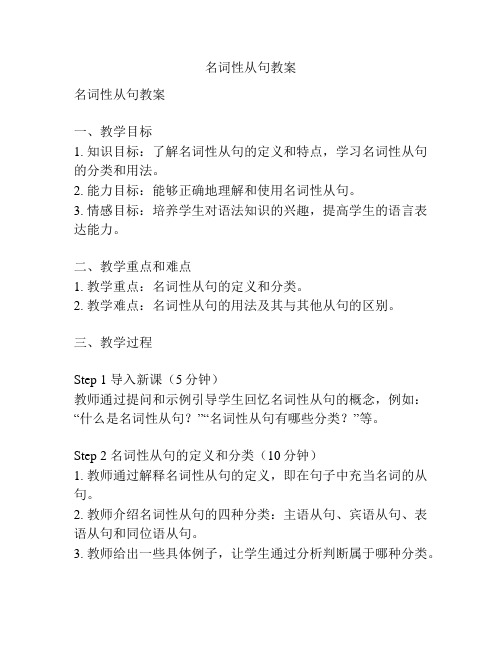
名词性从句教案名词性从句教案一、教学目标1. 知识目标:了解名词性从句的定义和特点,学习名词性从句的分类和用法。
2. 能力目标:能够正确地理解和使用名词性从句。
3. 情感目标:培养学生对语法知识的兴趣,提高学生的语言表达能力。
二、教学重点和难点1. 教学重点:名词性从句的定义和分类。
2. 教学难点:名词性从句的用法及其与其他从句的区别。
三、教学过程Step 1 导入新课(5分钟)教师通过提问和示例引导学生回忆名词性从句的概念,例如:“什么是名词性从句?”“名词性从句有哪些分类?”等。
Step 2 名词性从句的定义和分类(10分钟)1. 教师通过解释名词性从句的定义,即在句子中充当名词的从句。
2. 教师介绍名词性从句的四种分类:主语从句、宾语从句、表语从句和同位语从句。
3. 教师给出一些具体例子,让学生通过分析判断属于哪种分类。
Step 3 主语从句的用法和特点(15分钟)1. 教师通过例句和归纳总结,介绍主语从句的用法和特点。
2. 教师给出一些练习题,让学生完成句子的改写,将句子中的主语替换为主语从句。
Step 4 宾语从句的用法和特点(15分钟)1. 教师通过例句和归纳总结,介绍宾语从句的用法和特点。
2. 教师给出一些练习题,让学生完成句子的改写,将句子中的宾语替换为宾语从句。
Step 5 表语从句的用法和特点(15分钟)1. 教师通过例句和归纳总结,介绍表语从句的用法和特点。
2. 教师给出一些练习题,让学生完成句子的改写,将句子中的表语替换为表语从句。
Step 6 同位语从句的用法和特点(15分钟)1. 教师通过例句和归纳总结,介绍同位语从句的用法和特点。
2. 教师给出一些练习题,让学生完成句子的改写,将句子中的同位语替换为同位语从句。
Step 7 小结和巩固(10分钟)1. 教师对本课内容进行小结,确保学生对名词性从句有基本的理解和掌握。
2. 教师给出几道练习题,让学生进行巩固练习。
Step 8 作业布置(5分钟)教师布置相应的作业,要求学生通过完成作业进一步巩固和复习本课所学内容。
名词性从句教学案
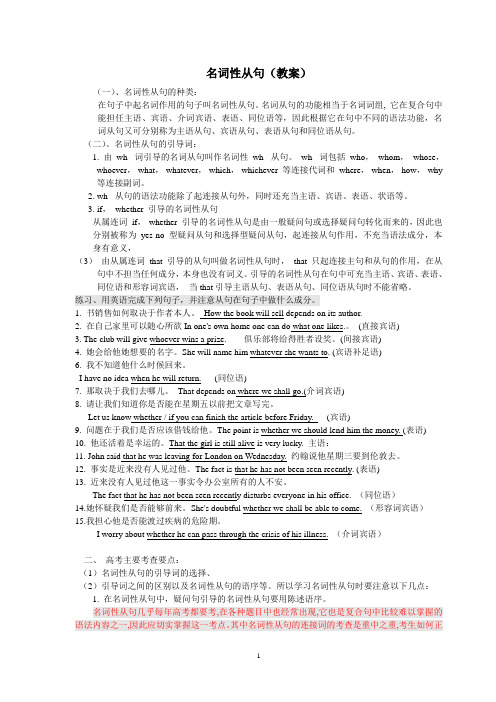
名词性从句(教案)(一)、名词性从句的种类:在句子中起名词作用的句子叫名词性从句。
名词从句的功能相当于名词词组, 它在复合句中能担任主语、宾语、介词宾语、表语、同位语等,因此根据它在句中不同的语法功能,名词从句又可分别称为主语从句、宾语从句、表语从句和同位语从句。
(二)、名词性从句的引导词:1. 由wh- 词引导的名词从句叫作名词性wh- 从句。
wh- 词包括who,whom,whose,whoever,what,whatever,which,whichever 等连接代词和where,when,how,why 等连接副词。
2. wh- 从句的语法功能除了起连接从句外,同时还充当主语、宾语、表语、状语等。
3. if,whether 引导的名词性从句从属连词if,whether 引导的名词性从句是由一般疑问句或选择疑问句转化而来的,因此也分别被称为yes-no 型疑问从句和选择型疑问从句,起连接从句作用,不充当语法成分,本身有意义,(3)由从属连词that 引导的从句叫做名词性从句时,that 只起连接主句和从句的作用,在从句中不担当任何成分,本身也没有词义。
引导的名词性从句在句中可充当主语、宾语、表语、同位语和形容词宾语,当that引导主语从句、表语从句、同位语从句时不能省略。
练习、用英语完成下列句子,并注意从句在句子中做什么成分。
1. 书销售如何取决于作者本人。
How the book will sell depends on its author.2. 在自己家里可以随心所欲In one's own home one can do what one likes.。
(直接宾语)3. The club will give whoever wins a prize.俱乐部将给得胜者设奖。
(间接宾语)4. 她会给他她想要的名字。
She will name him whatever she wants to. (宾语补足语)6. 我不知道他什么时候回来。
名词性从句导学案
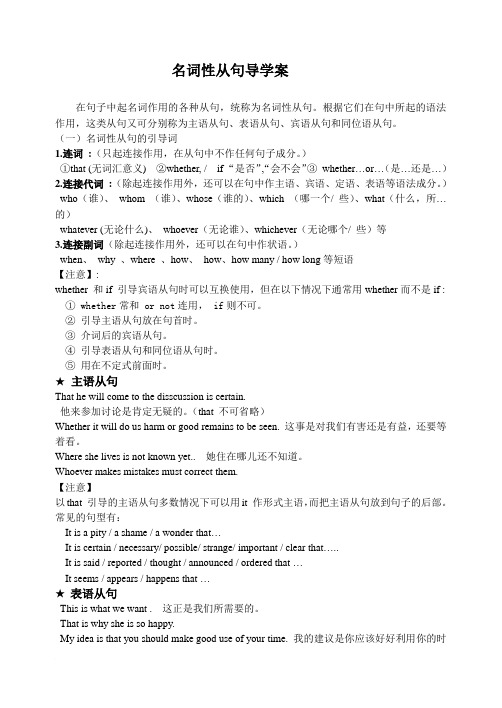
名词性从句导学案在句子中起名词作用的各种从句,统称为名词性从句。
根据它们在句中所起的语法作用,这类从句又可分别称为主语从句、表语从句、宾语从句和同位语从句。
(一)名词性从句的引导词1.连词:(只起连接作用,在从句中不作任何句子成分。
)①that (无词汇意义) ②whether, / if “是否”,“会不会”③whether…or…(是…还是…)2.连接代词:(除起连接作用外,还可以在句中作主语、宾语、定语、表语等语法成分。
)who(谁)、whom (谁)、whose(谁的)、which (哪一个/ 些)、what(什么,所…的)whatever (无论什么)、whoever(无论谁)、whichever(无论哪个/ 些)等3.连接副词(除起连接作用外,还可以在句中作状语。
)when、why 、where 、how、how、how many / how long等短语【注意】:whether 和if 引导宾语从句时可以互换使用,但在以下情况下通常用whether而不是if :① whether常和 or not连用, if则不可。
②引导主语从句放在句首时。
③介词后的宾语从句。
④引导表语从句和同位语从句时。
⑤用在不定式前面时。
★主语从句That he will come to the disscussion is certain.他来参加讨论是肯定无疑的。
(that 不可省略)Whether it will do us harm or good remains to be seen. 这事是对我们有害还是有益,还要等着看。
Where she lives is not known yet.. 她住在哪儿还不知道。
Whoever makes mistakes must correct them.【注意】以that 引导的主语从句多数情况下可以用it 作形式主语,而把主语从句放到句子的后部。
常见的句型有:It is a pity / a shame / a wonder that…It is certain / necessary/ possible/ strange/ important / clear that…..It is said / reported / thought / announced / ordered that …It seems / appears / happens that …★表语从句This is what we want . 这正是我们所需要的。
名词性从句优秀教案
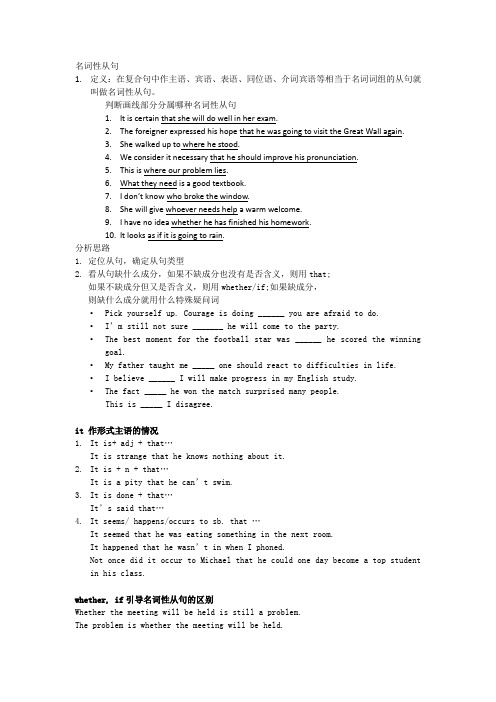
名词性从句1.定义:在复合句中作主语、宾语、表语、同位语、介词宾语等相当于名词词组的从句就叫做名词性从句。
判断画线部分分属哪种名词性从句1.It is certain that she will do well in her exam.2.The foreigner expressed his hope that he was going to visit the Great Wall again.3.She walked up to where he stood.4.We consider it necessary that he should improve his pronunciation.5.This is where our problem lies.6.What they need is a good textbook.7.I don’t know who broke the window.8.She will give whoever needs help a warm welcome.9.I have no idea whether he has finished his homework.10.It looks as if it is going to rain.分析思路1. 定位从句,确定从句类型2. 看从句缺什么成分,如果不缺成分也没有是否含义,则用that;如果不缺成分但又是否含义,则用whether/if;如果缺成分,则缺什么成分就用什么特殊疑问词•Pick yourself up. Courage is doing ______ you are afraid to do.•I’m still not sure _______ he wi ll come to the party.•The best moment for the football star was ______ he scored the winning goal.•My father taught me _____ one should react to difficulties in life.•I believe ______ I will make progress in my English study.•The fact _____ he won the match surprised many people.This is _____ I disagree.it 作形式主语的情况1.It is+ adj + that…It is strange that he knows nothing about it.2.I t is + n + that…It is a pity that he can’t swim.3.I t is done + that…It’s said that…4.I t seems/ happens/occurs to sb. that …It seemed that he was eating something in the next room.It happened that he wasn’t in when I phoned.Not once did it occur to Michael that he could one day become a top student in his class.whether, if引导名词性从句的区别Whether the meeting will be held is still a problem.The problem is whether the meeting will be held.I have no idea whether the meeting will be held.We had a heated discussion about whether the meeting will be held.虚拟语气与名词性从句(自己归纳)改错1.There is still doubt that the baby prince will become bald.2.The reason for her absence is because she got up too late.3.What we want to find out is if Wang Lin is still inside the country.4.That is what I can’t agree.5.Mary is no longer who she was two years ago.。
高中英语《Noun clauses名词性从句》优质课教案、教学设计
教学重点:1. 理解名词性从句的概念、分类;2. 掌握名词性从句的连接词及其所做成分。
教学难点:1. 掌握名词性从句的几大常考考点,特别是与定语从句的区分;2.名词性从句在语法填空和短文改错中的应用。
教学过程:壱、导入通过Enjoy an introduction,吸引学生兴趣。
同时快速地找出文中的连接词。
以此引出英语中的句型,即简单句、并列句和复合句。
另外,此处部分学生能迅速地提取出过去所学的定语从句的相关知识,便于引出定语从句与本节课所讲语法的对比和区分。
弐、相关概念通过展示一幅图片和一句话的形式,让学生在兴趣中积极找出所有的名词及名词性短语,并以提问抢答的方式让学生理解名词在句中所做的成分。
即主语、表语、宾语和同位语。
“M i c h ae l J a c ks o n,a fam o u s s i ng e r,i s a l s o a n o u tsta nd i ngdancer, and he likes pop music very much.”参、讨论名词性从句的形成和分类此处是学生理解名词性从句的关键之处。
通过两两句子的呈现方式,让学生有效地分析和比对,准确地学习和理解不同成分及其相应的从句。
1.The boy is Li Ming. (名词作主语)2.What he said is correct. (从句作主语)得出结论:在句中充当主语的从句叫做主语从句。
3.We love peace. (名词作宾语)4.He said that he had met her before.(从句作宾语)5.We must find out when he will come.(从句作介宾)得出结论:在句中充当及物动词或介词后面宾语的从句叫做宾语从句。
6.You are a student. (名词作表语)7.The fact is that she never knew the secret.(从句作表语)得出结论:在句中充当表语的从句(即放在系动词后面)叫做表语从句。
学案 名词性从句
名词性从句学案(Noun Clauses)名词性从句的概念The doctor suggests that Tom should give up smoking. ( )It is suggested that Tom give up smoking. ( )The doctor’s suggestion is that Tom should give up smoking. ( )The suggestion that Tom should give up smoking is accepted. ( )引导名词性从句的连接词引导名词性从句的连接词可分为三类:1、that2、whether, if(均表示“是否”表明从句内容的不确定性);as if ,as though(均表示“好像”,“似乎”)。
以上连接词在从句中均不充当任何成分。
3、what, whatever, who, whoever, whom, whose, which. Whichever, whomeverwhen, where, how, why在句中有意义,有成分。
具体分类主语从句①What he wants to tell us is not clear.Who will win the match is still unknown.It is known to us how he became a writer.Where the English evening will be held has not yet been announced.②It is immediately clear ____ the financial crisis will soon be over.A. sinceB. whatC. whenD. whether_____ was most important to her, she told me, was her family.A. ItB. ThisC. WhatD. As③It is necessary (important, natural, strange, etc.) that …It i s a pity (a shame, no wonder, etc.) that…It is suggested (requested, proposed, desired, etc.) that…It is obvious to the students ______ they should get well prepared for their future.A. asB. whichC. whetherD. that宾语从句①I want to know what he has told you.She always thinks of how she can work well.She will give whoever needs help a warm support.The companies are working together to create _______ they hope will be the best means of transport in the 21st century.A. whichB. thatC. whatD. whoCould I speak to is in charge of International Sales please?A. whoB. whatC. whoeverD. whatever②He has told me (tha)t he will go to Shanghai tomorrow.I know (that) he speaks good French and that his wife is from Russia.③I insist that she (should) do her work alone. 。
名词性从句优秀教案部分
高考英语名词性从句学案概念与分类名词性从句相当于名词,可分别在句中作主语、表语、宾语和同位语.因此,名词性从句可分为主语从句、表语从句、宾语从句和同位语从句.w.w.w.k.s.5.u.c.o.m 从属连词that:在从句中不充当任何成分,也没有任何意思,只起连接作用,因此往往可以省略从属连词if, whether:在从句中不充当任何成分,有意义,不可以省略连接代词who, whoever, whom, whomever, which, whichever, what, whatever, whose:在从句中充当成分,有意义,不可以省略连接副词where, when, why, how:在从句中充当成分,有意义,不可以省略一、主语从句1.由从属连词引导地主语从句:①________________________________________________is something we must discuss.那个国家是否应该建立核电站……②____________________________________________is known to all .光以直线传播2.由连接代词引导地主语从句:w.w.w.k.s.5.u.c.o.m①________________________________ more time.\some books.我们所需要地是……②________________________________ doesn’t matter to me.无论你选哪本书……③________________________________will be welcome.无论谁来……3.由连接副词引导地主语从句:①________________________________hasn’t been announced.飞机什么时候起飞……②_______________________________ is still a puzzle.他到过哪儿……③How much water is flowing can be measured easily.水地流量是多少……4.关于形式主语 it ①It + be +形容词+ that-从句It is necessary that…有必要……It is important that…重要地是……It is obvious that…很明显……It is likely that….很可能②It + be + -ed 分词+ that-从句It is believed that…人们相信……It is known to all that…众所周知……It has been decided that…已决定……③It + be +名词+ that-从句It is common knowledge that………是常识It is a surprise that…令人惊奇地是……It is a fact that…事实是…… 可应用于此句型地名词还有fact / shame / honor / question/pity等.④ It +不及物动词+ that-分句It appears that…似乎……It happens that…碰巧……It occurred to me that…我突然想起……It doesn’t matter whether he likes or not.二、表语从句可以接表语从句地连系动词有 be, look, remain, seem 等.The problem is_________________________________________ caused by smoking.……数百万人死于由抽烟引起地疾病The question remains________________________________…..我们是否能赢得这次比赛That’s just what I want. ……我想要地This is___________________________________. ……我们地问题所在The difficulty is how we can help smokers kick t heir habit……我们如何帮助吸烟地人……值得注意地是:1. 表语从句地表现形式除了用从属连词,连接代词和连接副词引导以外,还可以由as, as if ,as though引导.Things were not as they seemed.It looks as if it is going to rain.好象要下雨了.2、另外还要注意以下常用地两种结构:The reason why…is that … (而不用 because)It ( This, That ) is because…The reason ________ he was dismissed is _______ he didn’t work hard. 他为什么被开除是因为他工作不努力.It is ___________ the tobacco companies want to remain in business.同时还要注意:(1)引导表语从句地that不省略, that仅起连接作用, 在从句中不充当任何成分, 无任何意义.The impression he makes on me is __________ he is a reliable person.(2)the reason后面地表语从句只能用that引导, 我们学生易犯“the reason is because…”地错误.The reason_______ the little actress has been such a success is ________ she is both clever and hard-working.(3)在表示命令order等, 建议suggestion, advice等地名词后地表语从句中, 谓语动词要用虚拟语气: should+动词原形, should可省略His suggestion is that we __________ hold another meeting to discuss the problem.(4)whether可引导表语从句, 表“是否”, 它在从句中不充当成分, if则不能.The question is __________we can rely on him.(5)连接代词what, which, who, whom, whose除起连接作用外, 还在从句中做主语、宾语、表语和定语.That’s what he is worried about.(在从句作中作_______)The problem is who can do the work.(在从句中作_________)(6)连接副词when, where, why, how起连接作用外, 还在从句中作状语.That’s ___________I was late. That is ____________he did it.(7)连词because引导表语从句, 只用在 That/T his/It is because…结构中That is _____________ she often works hard.三、宾语从句一)引导词地选择宾语从句地引导词除that只起连接作用外,其他地都有各自具体地意义.因此我们在选择引导词时,要把句型结构、句意及习惯搭配结合起来,做全盘考虑.请看下面地例句:①You’ll have to decide ___________ car we’ll use, yours or mine.②You’ll have to decide ___________ car we’ll use, the old one or the new one.③You’ll have to decide ___________we’ll use the new car for.④You’ll have to decide ___________we’ll use the new car.A.which B.what C.whose D.whether再如:I still remember _____________ this used to be a small village.另外,要特别注意:动词或动词短语check,make sure等作肯定句地谓语时,全句在汉语意义上虽有“是否”之意,但后面常用that作引导词.如:Check ________ everything is in order,please.请核对一下是否一切正常.Make sure _______ the door is locked before you leave the lab.在离开实验室前,务必弄清门是否锁上了.二)that地省略与否that在口语中常省略.但在下列情况下,that一般不能省略:1.that从句置于句首以示强调或作简短回答时,如:That he has never seen such a thing I simply can’t believe.—What do you assume from his attitude﹖你从他地态度推测到什么?—That he was frightened.他很害怕.2.及物动词所带地第二个及以后地宾语从句中.He said________ Lesson 82 was important and _______ he should learn it well.他说第82课重要,他应学好它.3.that从句被短语、词组分开时.如:He told us once again ________he would never give up.他再次告诉我们他决不会放弃.4.在复合宾语中.如:He made it clear__________he wouldn’t give us an answer.他表明他不会给我们答复地.三)从句地谓语动词地形式当主句时态为一般过去时时,宾语从句地时态一般受其影响,要用过去地相应时态.并且,此影响延伸至宾语从句中定语从句、状语从句等.如:He said he _______ come if he________time.他说有时间他会来.但下列两种情形例外:1.当宾语从句为客观真理或普遍事实时,只用一般现在时.如:The voyage proved that the earth is round.那次航海证实了地球是圆地.2.当主句谓语动词为suggest, insist, demand等时,其宾语从句常用should型地虚拟语气,谓语为(should)+动词原形.如: He demanded that they (should) be there on time.他要求他们按时到那儿.四)从句地语序在宾语从句中只用陈述语序.如: He was not satisfied with______________.他对我说地不满意.He asked ___________________________.他问怎么啦.五)混合型地宾语从句当主句谓语动词为think/suppose/expect/believe等时,且其后地宾语从句为否定句,常将否定词not从从句中转移到主句中,构成否定转移;疑问句中what, who, how等要放在句首,构成混合型地宾语从句(也可把主句视为插入语).如:We don’t think there’s anything of interest in your picture,_______________? 我们认为你地画没有什么有趣地地方.What do you suppose_____________________﹖你推测他们需要什么?六)动宾介宾形宾从句七)whether与if在宾语从句中地区别:1、介词之后地宾语从句,不可用if连接,要用whether.e.g. I’m interested in ___________you’ve finished the work..2、whether与if都可以引导宾语从句,常可互换.但下面情况不能互换.①宾语从句是否定句时,只用if,不用whether.e.g. I wonder ________ it doe sn’t rain.②宾语从句中地whether 与or not直接连用,就不能换成if;不直接连用,可换.e.g. I don’t know whether or not the report is true.I don’t know whether/ if the report is true or not.③介词后地宾语从句要用whether引导.whether 可与不定式连用.whether也可引导主语从句、表语从句、同位语从句,还可引导让步状语从句,以上均不能换成if.e.g. It depends on __________we have enough time.They don’t know ________ to go there.四、同位语从句在复合句中充当同位语地名词性从句称为同位语从句.同位语从句是名词性从句(主语从句、表语从句、宾语从句、同位语从句)中地主要从句之一,在使用同位语从句时,应注意:一)同位语从句在句中地位置1.一般情况下同位语从句跟在某些名词(如news,idea,fact,promise,hope,message等)地后面,用以说明该名词所表达地具体内容.例如:The news _______________________________had won the championship encouraged us all greatly.我们女排赢得冠军地消息大大地鼓舞了我们所有人.I’ve come from Mr Wang with a message ____________________________________this afternoon.我从王先生那边得知一个消息,他说他今天下午不能来看你了.2.有时同位语从句可以不紧跟在它所说明地名词后,而被别地词语隔开,在语法上叫做分隔式同位语从句.例如:The thought came to her __________________________________________when she left home.她突然想起可能在她离开家时没把门关上.The story goes __________________________________________again.据说他高考又落榜.二)同位语从句前名词地数同位语从句前地名词通常用单数形式,并且往往带有限定词(word除外)加以修饰.如:Where did you get the idea _________ I could not come?你在哪儿听说我不能来?Give me your promise ________you will come to our party this evening.答应我,你今天晚上要来参加我们地晚会.Word came ________China launched its first manned spaceship on Oct 15,2003.消息传来,中国于2003年10月15日首次成功发射了载人飞船.三)同位语从句连接词地选用在英语中,引导同位语从句地词通常有连词(that,who,whether),连接副词(how,when,where)等.例如:They were all very much worried over the fact _________ you were sick.对你生病这件事,他们都很焦虑.The question _________ should do the work requires consideration.谁该做这项工作,这个问题需要考虑.We haven’t yet settled the question _________we are going to spend our summer vacation.我们还没有决定到什么地方去度暑假.注:在名词doubt“怀疑”后地同位语从句用whether连接;在no doubt“不怀疑”之后地同位语从句用that连接.例如:We have some doubt __________ they can complete the task on time.我们怀疑他们是否能准时完成任务.There is no doubt _________ Zhang Wei will keep his promise.我们相信张卫会守信地.同位语从句:that有些名词地后面可以接that引导地同位语从句:We came to the decision ________________________.我们做出决定:我们必须立即行动.There was little hope______________________________.他幸存地希望很小.以下名词常用于以上句型:advice,announcement,argument,belief,claim,conclusion,decision,evidence,explanation,fact,feeling,hope,idea,impression,information,knowledge,message,news,opinion,order,probability,promise,proposal,remark,reply,report,saying,statement,suggestion,thought,treat,warning,wish,word同位语从句:whetherwhether可以引导同位语从句,而定语从句不能用whether作为引导词.He hasn’t made the decision __________he will go there.他还没有做出决定是否去那里.I have small doubt _________ he is suitable for the job.他是否适合这件工作我有点怀疑.同位语从句:what what可以引导同位语从句,而定语从句不能用what作为引导词I have no idea _________he is doing now.我不知道他现在在干什么.同位语从句:how how可以引导同位语从句,而定语从句不能用how作为引导词It’s a question ________ he did it.那是一个他如何做了此事地问题.同位语从句:who等who,whom,which,when,where,why用来引导同位语从句The question ________should do the work requires consideration.谁该干这项工作,这个问题需要考虑.She raised the question _________we could get the fund.她提出这个问题:我们到哪儿去搞这笔资金.四)同位语从句地语气在suggestion,advice,request,order等意为“建议;命令;要求”地名词后,同位语从句中地谓语动词通常用“should +动词原形”地虚拟语气结构,句中地should可以省略.例如:Our teacher gave us some advice_________________________.老师给我们提出了一些如何使用电脑地建议.The suggestion came from the chairman ____________________________________.采纳新规则地建议是主席提出来地.The government gave the order that_____________________________________________ in three weeks.政府下令三个星期内所有这些房子都要拆掉.五)同位语从句与定语从句地用法区别区别(1)同位语从句和先行词是同等地关系;而定语从句是用来修饰先行词,是从属地关系.区别(2)that在同位语从句中没有词义,不充当句子成分;而在定语从句中充当主语、宾语等句子成分.他带给我们地消息令我们非常高兴.___________________________________________________________________________他获胜地消息令我们非常高兴.___________________________________________________________________________区别(3)whether,what,how可以用来引导同位语从句;而它们不能用来引导定语从句.区别(4)1.从词义角度看问题who,whom,which,when,where,why用来引导同位语从句是保持原来疑问词地含义;它们用来引导定语从句时,不具有疑问词地含义.2.从搭配角度看问题who,whom,which,when,where,why用来引导定语从句时对应性很强,如:先行词是“人”,引导词用“who”等,而它们引导同位语从句是先行词通常是“question,idea,doubt等”.六、典型例题例1:I have no idea ________he will be back.例2:I have no impression _________ he went home,perhaps by bike.例3:Information has been put forward ____ more middle school graduates will be admitted into universities.(NMET2001上海)A.whileB.thatC.whenD.as区别:It is said that more middle school graduates will be admitted into universities,this is the information ____ has been put forward.A.whatB.thatC.whenD.as例4:She heard a terrible noise,____ brought her heart into her mouth.(MET91)A.itB.whichC.thisD.that区别:I can’t stan d the terrible noise ____ she is crying loudly.A.itB.whichC.thisD.that高中总复习英语名词性从句专项练习卷1.Evidence came up _________ specific speech sounds are recognized by babies as young as 6 months old.A.whatB.whichC.whoseD.that2.________was known to us all,William had broken his promise ________he would give us a rise.A.As;whichB.As;thatC.It;thatD.It;which3.Father made a promise_______I passed the examination he would buy me a bicycle.A.thatB.ifC.whetherD.that if4.After months of voyage,Columbus arrived in_________later proved a new continent.A.whereB.whichC.whatD.that5.Tom insisted that what he said true and we insisted that he and have a look.A.be;should goB.should be;should beC.was;goD.was;would go6.The reason _______ she missed school this morning was_________he had to look after her sick grandpa.A.why;thatB.because;whyC.that;becauseD.which;that7.It made many countries angry_________America,without the _________ from the UN,started a war in Iraq.A.that;permissionB.which;permitC.which;permissionD.that;permit8.It was with great joy_______ he received the news_______ his lost daughter had been found.A.because;thatB.since;whichC.for;aboutD.that;that9.You are saying that everyone should be equal,and this is _______I disagree.A.whyB.whereC.whatD.how10.The shopkeeper did not want to sell for________ be thought was not enough.A.whereB.howC.whatD.which11.Along with the letter was his promise_______________ he would visit me this coming Christmas.A.whichB.thatC.whatD.whether12.My pen-friend,Peter,wrote to me,expressing the hope ________ he would come to Beijing to see the 2008 Olympic Games.A.whichB.thatC.whatD.whether13.“_________is no doubt_________ the Chinese and the China government will again win the battle against SARS if the illness come s about again,”said the spokesman.A.It;whetherB.There;thatC.It;thatD.There;whether14.I was shocked by the news,which made me realize________terrible problems we would face.A.howB.whichC.whatD.that15.All finished,we sat down to enjoy ________ we thought the most delicious dinner.A.whatB.whichC.thatD.it16.______ some t eenagers don’t realize is _____difficult life can be after they get addicted to drugs.A.What;howB.That;howC.That;what aD.What;what a17.He is_____ is known as a hacker—he likes to show off on the Internet and attack websites. A.who B.which C.that D.what18.The question has been raised at the meeting______each mem-ber country should share the expenses of the committee.A.whichB.ifC.whatD.whether19._____different views from ours at the meeting was not surprising since she is an environmentalist.A.She expressedB.When she expressedC.That she expressedD.Whether she expressed20.Please remind me_______ he said he was going.I may be in time to see him off.A.whereB.whenC.howD.what21.—What did your parents think about your decision?—They always let me do________I think I should.A.whenB.thatC.howD.what22.After________ seemed an endless wait,it was her turn to listen to the music.A.whatB.thatC.itD.there23.—Are you still thinking about yesterday’s game?—Oh,that’s _________.A.what makes me feel excitedB.whatever I feel excited aboutC.how I feel about itD.when I feel excited24.America was_________ was first called “India” by Columbus.A.thatB.whereC.whatD.the place25._______ worried her a bit was _______ her hair was turning grey.A. What; whatB. That; thatC. What; thatD. That; what26.Here are all the books I have.You may borrow_________you like.A.thatB.whichC.howeverD.whichever27.It was not until dark________he found_______he thought was the best way to solve the problem.A.that;whatB.that;thatC.when;whatD.when;that28.Xiao Hong is very clever.In fact,I sometimes doubt _______ anyone in the class has a higher IQ.A.thatB.whetherC.whenD.why29.You are saying that everyone is born equal, and this is _______ I disagree.A. whyB. whereC. whatD. how30.In some countries,__________ is called “equality”does not really mean equal rights for all the people.A.whichB.thatC.whatD.who高考英语陷阱题总结归纳——名词性从句1. She was so angry and spoke so fast that none of us understood _______ he said meant.A. thatB. whatC. that thatD. what what2. After _______ had happened he could not continue to work there.A. whichB. howC. whatD. having比较:He pointed to ______ looked like a tomb and said, “Ghost.”A. thatB. whatC. whichD. as3.“Is ______ you want to say?” asked the teacher.A. thisB. thatC. all thatD. that all4. “When ______ leave for Japan?” “When ______ leave for Japan is kept secret.”A. they will, will theyB. will they, they willC. they will, they willD. will they, will they比较:(1) None knows if _______ that boy, but if _______ him, her parents will be disappointed.A. she will marry, she will marryB. she marries, she marriesC. she will marry, she marriesD. she marries, she will marry(2)“Where _______ go to work?” “Where _______ go to work is not known.”A. we shall, we shallB. shall we, shall weC. shall we, we shallD. we shall, shall we5. Someone is ringing the doorbell. Go and see ______.A. who is heB. who he isC. who is itD. who it is6. Don’t you know, my dear friend, ______ it is your money not you that she loves?A. whoB. whichC. thatD. what比较:(1) Everyone knows, perhaps except you, _______ your girl-friend is a cheat.A. whoB. whichC. thatD. what(2) I think, though I could be mistaken, ______ she liked me.A. whoB. whichC. thatD. what(3) He told me the news, believe it or not, ______ he had earned $1 000 in a single day.A. thatB. whichC. asD. because◆精编陷阱题训练◆1. They lost their way in the forest, and _______ made matters worse was that night began to fall.A. itB. whichC. thatD. what2. Patience is a kind of quality — and that is ___A___ it takes to do anything well.A. whatB. whichC. whichD. how3. It has come to my notice _______ some of you have missed classes.A. whatB. whichC. thatD. when4. “What were you trying to prove to the police?”“___ I was last night.”A. ThatB. WhenC. WhereD. What5. Country life gives him peace and quiet, which is ______ he can’t enjoy while living in big cities.A. thatB. whyC. whereD. what6. It is pretty well understood _______ controls the flow of carbon dioxide in and out the atmosphere today.A. thatB. whenC. whatD. how7. _______ she couldn’t understand was ______ fewer and fewer students showed interest in her lessons.A. What; whyB. That; whatC. What; becauseD. Why; that8. _______ we are doing has never been done before.A. ThatB. WhatC. WhichD. Whether9. People have heard _______ the President has said; they are waiting to see _______ he will do.A. how, howB. what, whatC. when, howD. that, what10. When you answer questions in a job interview, please remember the golden rule: Always give the monkey exactly _______ he wants.A. whatB. whichC. whenD. that11. These wild flowers are so special I would do _______ I can to save them.A. whateverB. thatC. whichD. whichever12. _______ she was invited to the ball made her very happy.A. WhatB. ThatC. WhenD. Because13. Eat ______ cake you like and leave the others for ______ comes in late.A. any, whoB. every, whoeverC. whichever, whoeverD. either, whoever14. I had neither a raincoat nor an umbrella. _______ I got wet through.A. It’s the reasonB. That’s whyC. There’s whyD. That’s because15. ____ has helped to save the drowning girl is worth praising.A. WhoB. The oneC. AnyoneD. Whoever16. _______ medicine works in a human body is a question _______ not everyone can understand fully.A. How; thatB. That; whichC. That; whichD. What; that历届高考英语单项选择题精选---名词性从句1.These photographs will show you _____.A. what does our village look likeB. what our village looks likeC. how does our village look likeD. how our village looks like (89)2.Can you make sure ______ the gold ring?A. where Alice had putB. where did Alice putC. where Alice has putD. where has Alice put (90)3.No one can be sure _____ in a million years.A. what man will look likeB. what will man look likeC. man will look like whatD. what look will man like (91)4.--We haven't heard from Jane a long time.--What do you suppose _____ to her?A. was happeningB. has happenedC. to happenD. having happened (91)5.Go and get your coat. It's _____you left it.A. thereB. whereC. there whereD. where there (92)6.He asked _____ for the violin.A. did I pay how muchB. I paid how muchC. how much did I payD. how much I paid (92)7._____ the 2000 Olympic Games will be held in Beijing is not known yet.A. WheneverB. IfC. WhetherD. That (92)8._____ he said at the meeting astonished everyone present.A. WhatB. ThatC. That factD. The matter (93)9.--Do you remember _____ he came?--Yes, I do . He came by car.A. howB. whenC. thatD. it (94)10._____ we can't get seems better than ______ we have.A. What , whatB. What , thatC. That , thatD. That , what (95)11.Dr. Black comes from either Oxford or Cambridge, I can't remember _____.A. whereB. thereC. whichD. that (98)12.--I drove to Zhuhai for the air show last week.--Is that _____ you had a few days off?A. whyB. whenC. whatD. where (99)13.______she couldn't understand was _______ fewer and fewer students showed interest in her lesson.A. What , whyB. That , whatC. What , becauseD. Why , that (2000)14.Someone is ringing the doorbell. Go and see _______.A. who is heB. who he isC. who is itD. who it is (2000)15.There’s a feeling in me _______ we’ll never know what a UFO is---not ever.A. thatB. whichC. of whichD. what(2002,上海)16. --Are you still thinking about yesterday' s game?--Oh, that's _____.(2003北京春季)A. what makes me feel excitedB. whatever I feel excited aboutC. how I feel about itD. when I feel excited17.It is pretty well understood _____ controls the flow of carbon dioxide in and out theatmosphere today.( 2003上海)A thatB whenC whatD how18.There is a new problem involved in the popularity of private cars_____ road conditions need_____.(2003上海)A that; to be improvedB which; to be improvedC where; improvingD when; improving19.You are saying that everyone should be equal, and this is ______ I disagree.(2004全国I)A whyB whereC whatD how20.We cannot figure out______ quite a number of insects, birds, and animals are dying out.A thatB asC whyD when(2004北京)21.A modern city has been set up in ______ was a wasteland ten years ago.(2004天津)A whatB whichC thatD where22. After Yang Liwei succeeded in circling the earth, _______ our astronauts desire to do is walkin space.(2004上海)A. whereB. whatC. thatD. how23. A story goes ______ Elizabeth I of England liked nothing more that being surrounded byclever and qualified noblemen at court. (2004上海)A. whenB. whereC. whatD. that24. I think Father would like to know ____ I've been up to so far, so I decide to send him aquick note.(2004湖南)A. whichB. whyC. whatD. how25.I have always been honest and straightforward, and it doesn’t matter ______ I’m talking to.A. who is itB. who it isC. it is whoD. it is whom(2004广东)26. Parents are taught to understand ______ important education is to their children’s future.A. thatB. howC. suchD. so(2004广东)27.(2005全国I)23.Mary wrote an article on the team had failed to win the game .A.why B.what C.who D.that28.(2005全国II)11.The poor Youngman is ready to accept ______ help he can get.A whicheverB howeverC whateverD whenever29.(2005上海)38. _________ in the regulations that you should not tell other people the password of your e-mail account.A. What is requiredB. What requiresC. It is requiredD. It requires30.(2005天津)2. Elephants have their own way to tell the shape of an object and _______it is rough or smooth.A. 不填B. whetherC. howD. what31.(2005)34. The old lady’s hand shook frequently. She explained to her doctor ______ this shaking had begun half a year before, and _____, only because of this, she had been forced to give up her job.A. when; howB. how; whenC. how; howD. why; why32.(2005湖南)35. I was surprised by her words, which made me recognize ___ silly mistakes I had made.A. whatB. thatC. howD. which33.(2005浙江)15.Danny left word with my secretary ______ he would call again in the afternoon.A whoB thatC asD which34.(2005辽宁)29.Do you have any idea ________ is actually going on in the classroom?A.that B.what C.as D.which35.(2005山东)26. The shopkeeper did not want to sell for ______ he thought was not enough.A. whereB. howC. whatD. which36.(2005江西)33.The way he did it was different ____________we were used to .A.in which B.in what C.from what D.from which37.(2005安徽)32. Great changes have taken place in that school. It is no longer ______ it was 20 years ago, ______ it was so poorly equipped.A. what; whenB. that; whichC. what; whichD. which; that38.(2005广东) 34.Some researchers believe that there is no doubt ______ a cure for AIDS will befound.A whichB whatC thatD whether39.(2005江苏)33.---- Don't you think it necessary that he _______ to Miami but to New York?---- I agree, but the problem is ________ he has refused to.A. will not be sent; thatB. not be sent; thatC. should not be sent; whatD. should not send; what。
名词性从句学案(语法精讲-主语从句、宾语从句、表语从句、同位语从句)+经典习题(含答案)
名词性从句名词性从句〔主语、表语、宾语、同位语从句〕(一)主语从句1.定义:用作主语的从句叫做主语从句。
2.构成:关联词+简单句3.引导主语从句的关联词有三类:(1) 附属连词that。
如:That they were in truth sisters was clear from the facial resemblance between them.很明显,她们确是亲姐妹,她们的脸型很相似。
(2) 附属连词whether。
如:Whether he’ll come here isn’t clear. 他是否会来这里还不清楚。
(3) 连接代词who, whom, whose, what, which, whoever, whatever, whichever连接副词where, when, how, why。
如:What she did is not yet known. 她干了什么尚不清楚。
解释:1.主语从句能用it作形式上的主语。
常以it作形式主语的句型有:A. It+be+形容词(obvious, true, natural, surprising, good, wonderful, funny, possible, likely, certain, probable, etc.)+that从句。
如:It is certain that she will do well in her exam. 毫无疑问她考试成绩会很好。
B. It+be+名词词组(no wonder, an honour, a good thing, a pity, no surprise, etc.)+that从句。
如:It’s a pity that we can’t go. 很遗憾我们不能去。
C.It+seem, happen等不及物动词及短语+that从句。
如:It seems that Alice is not coming to the party at all. Alice似乎不来参加晚会。
- 1、下载文档前请自行甄别文档内容的完整性,平台不提供额外的编辑、内容补充、找答案等附加服务。
- 2、"仅部分预览"的文档,不可在线预览部分如存在完整性等问题,可反馈申请退款(可完整预览的文档不适用该条件!)。
- 3、如文档侵犯您的权益,请联系客服反馈,我们会尽快为您处理(人工客服工作时间:9:00-18:30)。
二、基础知识回顾:
1.名词性从句的定义、句法功能和分类
由连接词引导,在复合句中起____词作用的从句叫名词性从句(NounClauses)。名词性从句在复合句中的功能相当于名词词组,它在复合句中能担任________语、_______语、________语和_______语等,因此根据它在句中不同的句法功能,名词性从句又可分别分为________从句、__________从句、___________从句,和_________从句。
名词性从句复习学案
班级_____________组别_________________姓名__________________
【自主学习,明确目标】
1.教学目标:1)了解名词性从句的定义、种类,及其位置。
2)掌握名词性从句的语序,引导词的选择及其技巧。
2.教学重点:熟记that,whether,if,what,which等引导词的特殊用法。
4.Whatweneed__________(be)moretime.
5.Whatweneed_________(be)moredictionaries.
小结三:1.单个的主语从句作主语时,主句的谓语动词一般用_______数形式。(如例1)
2.由两个或多个连接词引导一个主语从句,谓语动词用_______数形式。(如例2)
7.IhavenoideawhichoneIshouldchoose.(____________从句)
小结一:1.______从句在复合句中作主语。________从句一般位于主句________词或介词之后(如例1),为避免主语冗长,句子头重脚轻,经常用_______作形式主语,而把主语从句放在句末(如例2)。
2.引导名词性从句的连接词,及其在句中的作用。
名词性从句的引导词
在从句中的作用
连词
that(无意义),whether/if(是否)
不充当句子成分,只起连接作用
连接代词
what,who,whom(宾格),which,whose,
whatever,whoever,whomever,whichever
主语,宾语,表语,
MynameisLiQing.WhatIlikemostaresportsandEnglish.IlikemakingfriendsandIamreadytohelpothers.Inmyopinion,successinlifedependsmainlyonwhetheronecangetalongwellwithothers.I’msurethatIcanbeyourgoodfriend.Itisknownthatamanwhohasasettledpurpose(明确的目标)willsurelysucceed.MyhopeisthatIcanbeadmittedtoakeyuniversityI’mdreamingof.However,itisafactthatIdon’tdoverywellinstudy.Allinall,Iwillmakemoreeffortstomakemydreamcometrue.
1.Whenthemeetingwillbegin_________(have)notbeendecidedyet.
2.Whenandwherethemeetingwillbegin_________(have)notbeendecidedyet.
3.Whentheywillstartandwheretheywillgo_________(be)stillunknown.
1.______hewantsisencouragement.2.Ihavenodoubt_____youwillsucceed.
3.Thisis_____wewanttoknow.4.Heisnolonger____heusedtobe.
小结:1.That在名词性从句中_______任何成分,只起连接作用,即当从句是完整的也不缺任何意义时,就选_______。
1.Heisagoodstudentexcept________heisalittlebitcareless.
2.Youmaydependon__________weshallneverloseheart.
【问题拓展,能力提升】
读下面一篇作文,划出文中的名词性从句,并说明是什么从句(主语、宾语、表语从句)。
3.如果是两个或两个以上的主语从句作主语,谓语动词则用_______数形式。(如例3)
4.由what引导从句作主语时,主句的谓语动词的数一般与后面的______语的数保持一致。(如例4、5)
探究四:连接词的选用:
(一)whether和if的选用(用A.whether/ifB.whetherC.if填空)
A.howtheywereexcitedB.howexcitedtheywere
C.howexcitedweretheyD.theywerehowexcited
小结二:名词性从句在句中要用_______语序,(即连接词+主语+谓语……),从句的引导词必须始终置于从句的句首。
探究三:主谓一致问题:(用括号中的词的适当形式填空。)
2.Itisknowntoallthattheearthturnsaroundthesun.(句意:________从句)
3.Don’tputofftilltomorrowwhatshouldbedonetoday.(句意:________从句)
4.Childrenarewhatthemothersare.(句意:________从句)
1.Iaskedher__________shehadabike.2.Itisdoubtful_________hewillcomehere.
3._____________hewillcomeisnotclear.4.Thequestionis__________he’llcome.
5.Ihaven’tdecided_______togothere.6.Italldependson________theywillsupportus.
2.Itis?reported?that?three?people?were?killed?in?the?trafficБайду номын сангаасaccidentyesterday.(___________从句)
3.Thequestioniswhetherthefilmisworthseeing.(____________从句)
3.Thereasonwhyhewaslatewas_______hemissedthetrainbyoneminute.
探究五:连词that
(一)that的省略(选择A.thatB.(that)填空)
1.Theresultis__________wewonthegame.
2.Ithink________itwillclearupthisafternoonand__________theywillcometosaygoodbyetous.
4.Iwonderedwhyyouweresoangry.(____________从句)
5.Italldependsonhowwesolvetheproblem.(____________从句)
6.Ithinkitnecessarythatweshoulddoourhomework.(_____________从句)
3.易混淆点:1)whether,if的区别;2)that,what的区别;
3)what,which的区别4)主语从句中的主谓一致问题。
【自主学习,问题生成】
一、感受名词性从句:猜猜下列谚语的汉语意思,并判断各句中的名词性从句分别是什么从句。
1.What'slostislost.(句意:______________________________________________________从句)
1.TheIndiansusedtolivein________isnowpartoftheUSA.
2.Therearemanykindsofbikesintheshop.Idon'tknow__________tochoose.
3.Iwanttobuysomethingformymotherasagift,butIdon’tknow_________tobuy.
7.Idon’tknow________ornotheiswell.8.Ihavenoidea_________themeetingwillbeputoff.
小结:1.用whether,if均可的情况:
(1)引导_______词后的宾语从句(如例1);(2)当it作形式主语,主语从句在________时(如例2)
3).确定词性后,再根据句子的意思选择适当的引导词。
我的问题:(你在预习中有哪些未能解决的问题和有疑问的地方?写在下面做个备忘吧!等待课堂上与老师和同学他就讨论解决。)
【合作探究,解决问题】
探究一:观察句子,找出主句谓语,划出从句,判断从句类型。
1.Whoevercomesiswelcome.(____________从句)
1.Noonecanbesure____inamillionyears.
A.whatwillmanlooklikeB.whatmanwilllooklike
C.manwilllooklikewhatD.whatlookwillmanlike
2.Youcan’timagine____whentheyreceivedtheseniceChristmaspresents.
4.Itisstillunknown_________teamwillwinthematch.
